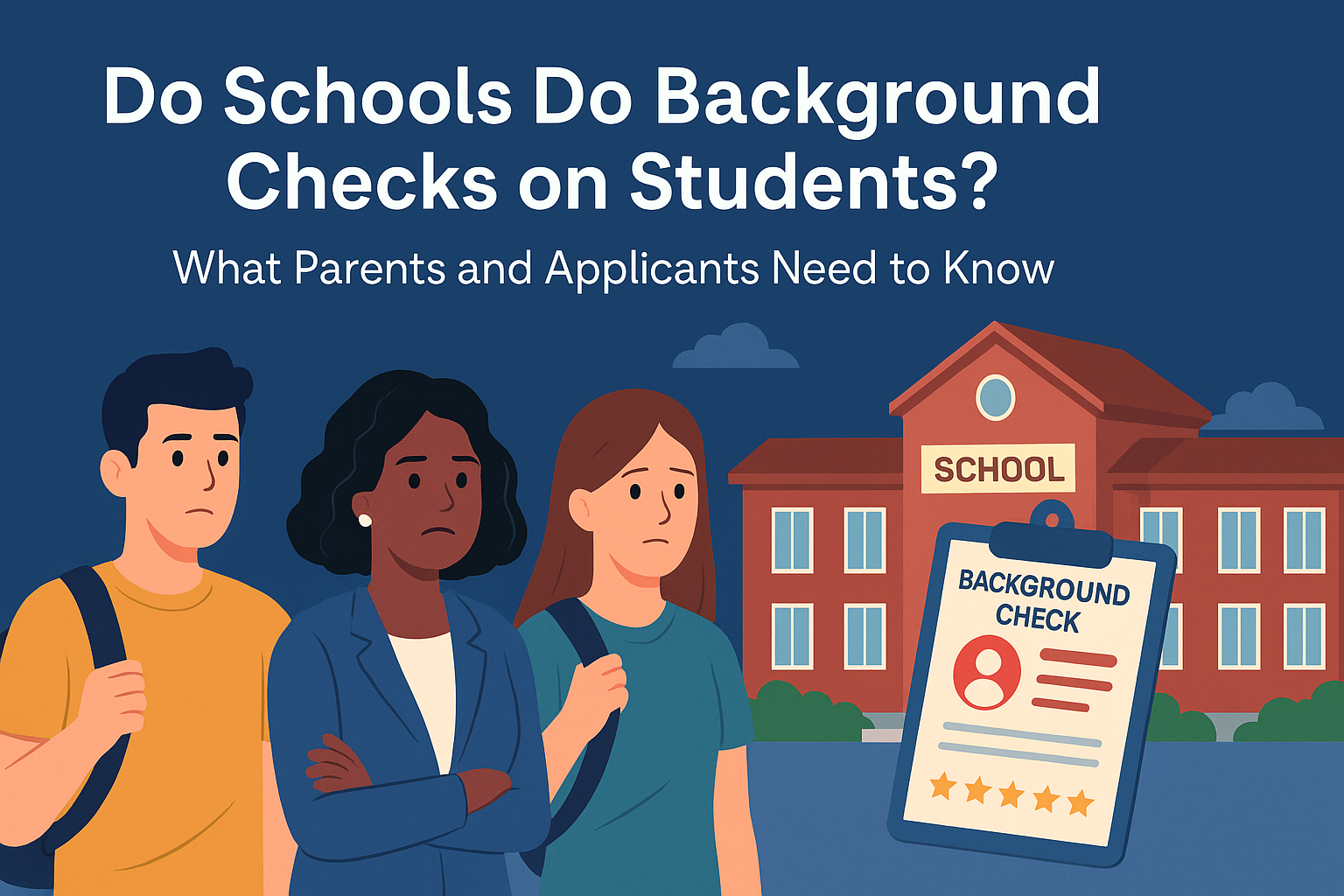Estimated reading time: 5 minutes
As safety protocols tighten and reputations become increasingly searchable, a rising question among families and students is: Do schools do background checks on students? Whether you’re applying to a private high school, public university, or graduate program, understanding how schools vet applicants is essential.
In this comprehensive guide, we examine student background checks across education levels, break down what schools can legally access, and explore how your online presence can impact your academic journey.
Table Of Content
When and Why Schools Conduct Background Checks
Schools don’t routinely run full criminal background checks on every applicant. However, they may do so under specific conditions:
- Safety and security protocols (especially for on-campus housing)
- Programs involving minors or vulnerable populations
- Legal compliance (e.g., nursing, teaching, law enforcement fields)
- Behavioral concerns or red flags in the application
In addition, private institutions may include more rigorous background verification, including calls to previous schools, review of conduct records, and even parental interviews in some K–12 settings.
What Kind of Information Can Schools Access?
1. Academic and Disciplinary Records
- High school transcripts
- Disciplinary records (suspensions, expulsions)
- Letters of recommendation referencing behavioral concerns
These records help institutions assess not only academic performance but also character and conduct.
2. Criminal Records (in Certain Cases)
- Juvenile offenses (depending on state law)
- Adult criminal charges (if disclosed voluntarily)
- Sex offender registries (especially for housing purposes)
Criminal history disclosures are often self-reported, and not all schools will conduct formal background checks unless the program warrants it.
3. Online Presence and Social Media
While not an official “background check,” many admissions officers search applicants on:
- TikTok
- Reddit or student forums
A 2023 Kaplan survey found that 36% of college admissions officers checked applicants’ social media, with some stating it helped in admission decisions.
Additional Background Check Scenarios by Education Level
K–12 Education
- Rarely includes background checks for students
- Exceptions: Transfers with known safety issues, court orders, or school threats
- May request disciplinary records from previous schools
Colleges and Universities
- May ask about criminal history or disciplinary actions on applications
- More likely to conduct checks if students are applying to live in dorms or participate in sensitive programs
Graduate Programs and Licensure Fields
Programs in:
- Nursing
- Law
- Education
- Counseling
- Psychology
…often require background checks due to licensing requirements.
Can Schools See Expunged or Sealed Records?
In most states, expunged or sealed juvenile records are not visible to schools. However:
- Background check agencies may include outdated data
- Manual searches or online posts can still reveal information
To ensure complete privacy, consider contacting data broker sites directly to request removal of old information.
What About FERPA and Student Privacy Rights?
The Family Educational Rights and Privacy Act (FERPA) protects student education records from unauthorized disclosure. However, FERPA does not cover:
- Information students provide voluntarily
- Publicly accessible court records
- Search engine content or social media
Additionally, once a student turns 18 or enters college, they become the sole custodian of their education record—meaning parents cannot request or view background-related records without consent.
Learn more via FERPA Overview – U.S. Department of Education
Red Flags Schools May Discover
- Public arrest records
- News stories involving criminal behavior
- Disciplinary actions posted online
- Explicit or offensive content on social media
- Online reviews or posts with hate speech or harassment
Even without formal checks, Google searches often reveal content that influences decision-makers.
What Do Background Checks for Students Include?
Depending on the institution and the purpose of the check, components might include:
- National criminal database search
- County courthouse searches
- SSN validation
- Sex offender registry scan
- Education history verification
- Drug screening (for specific programs)
Checks are often run through third-party vendors and must comply with Fair Credit Reporting Act (FCRA) requirements.
How to Protect Your Online Reputation Before Applying
1. Google Yourself
Search your full name with location or school info:
"John Smith" + "Chicago" + "high school"Note mugshots, arrest reports, negative blog posts, and images that may raise concern.
2. Clean Up Social Media
- Delete inappropriate posts or offensive comments
- Un-tag yourself from damaging content
- Review old usernames and handles that may be linked to you
3. Suppress Negative Search Results
Use reputation tools or SEO content creation to boost:
- Scholarship announcements
- Sports or community achievements
- LinkedIn or academic blog content
How Defamation Defenders Helps Students and Families
Defamation Defenders provides:
- Online background reputation audits
- Mugshot and article takedowns
- SEO content to highlight achievements
- Suppression of old forum posts and archived threads
Whether you’re applying to college, grad school, or a scholarship, we help protect your online narrative.
📞 Schedule a free consultation to start building a safer reputation profile.
FAQ: Do Schools Do Background Checks on Students?
Not typically. Unless there’s a legal requirement, safety threat, or court order, K–12 students are not subject to background screening.
Yes, but they often consider the severity, time since the offense, and personal growth. Full transparency helps.
Absolutely. Many admissions officers consider social media a reflection of character.
Usually not—but third-party data brokers or old media may still show it online.
Yes. Use services like Checkr, GoodHire, or your local police department for self-screening.
Yes, if disclosed with permission. Transcripts and discipline reports may be reviewed.
Yes. Start by auditing your search results and removing outdated content. Reputation services can also help suppress or remove damaging items.
Yes. Some competitive scholarships, especially government-funded or military-affiliated, may include criminal or academic vetting.
Yes. They often contact previous schools and may investigate red flags including social media activity or police interactions.
Related Contents:



